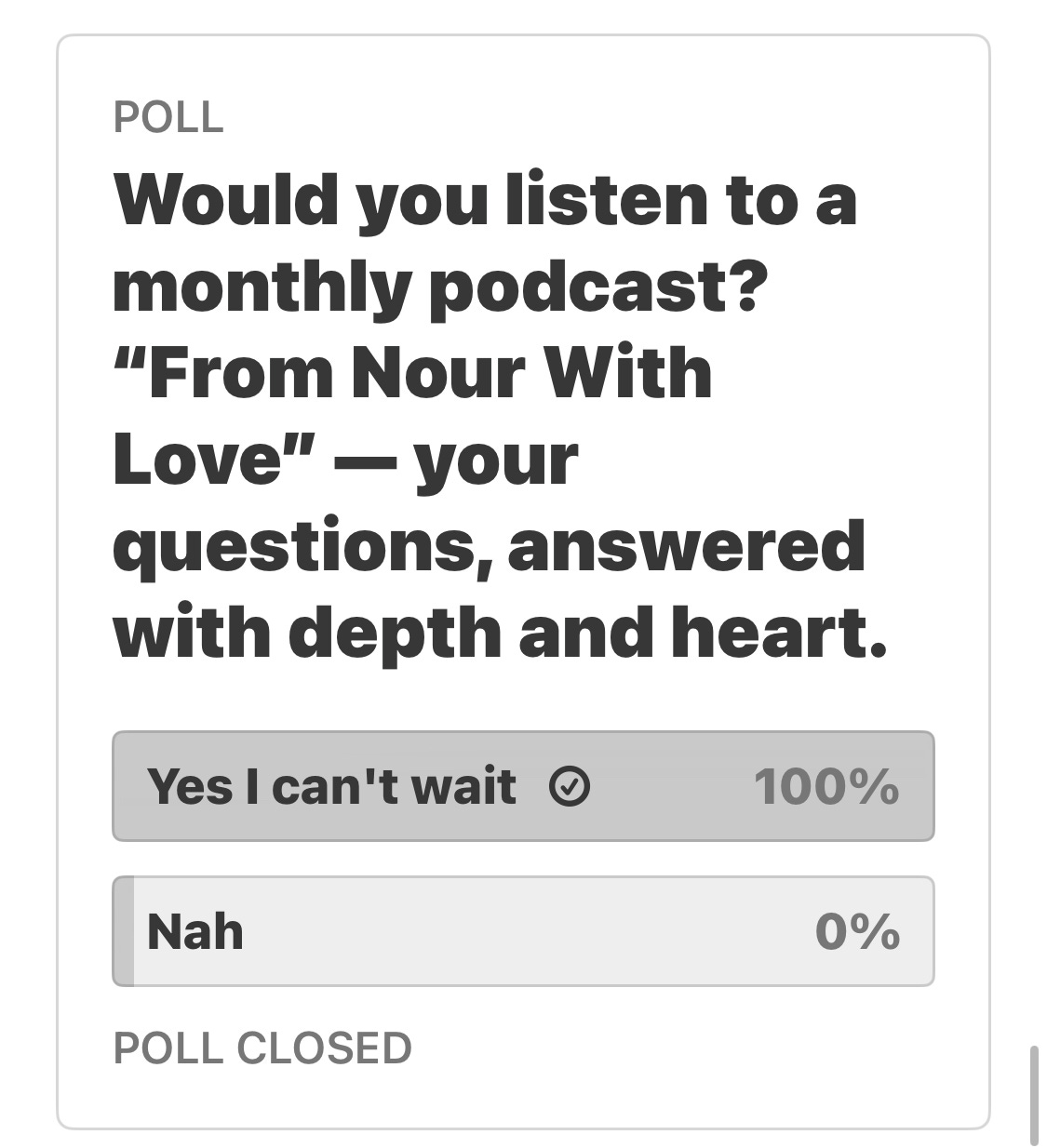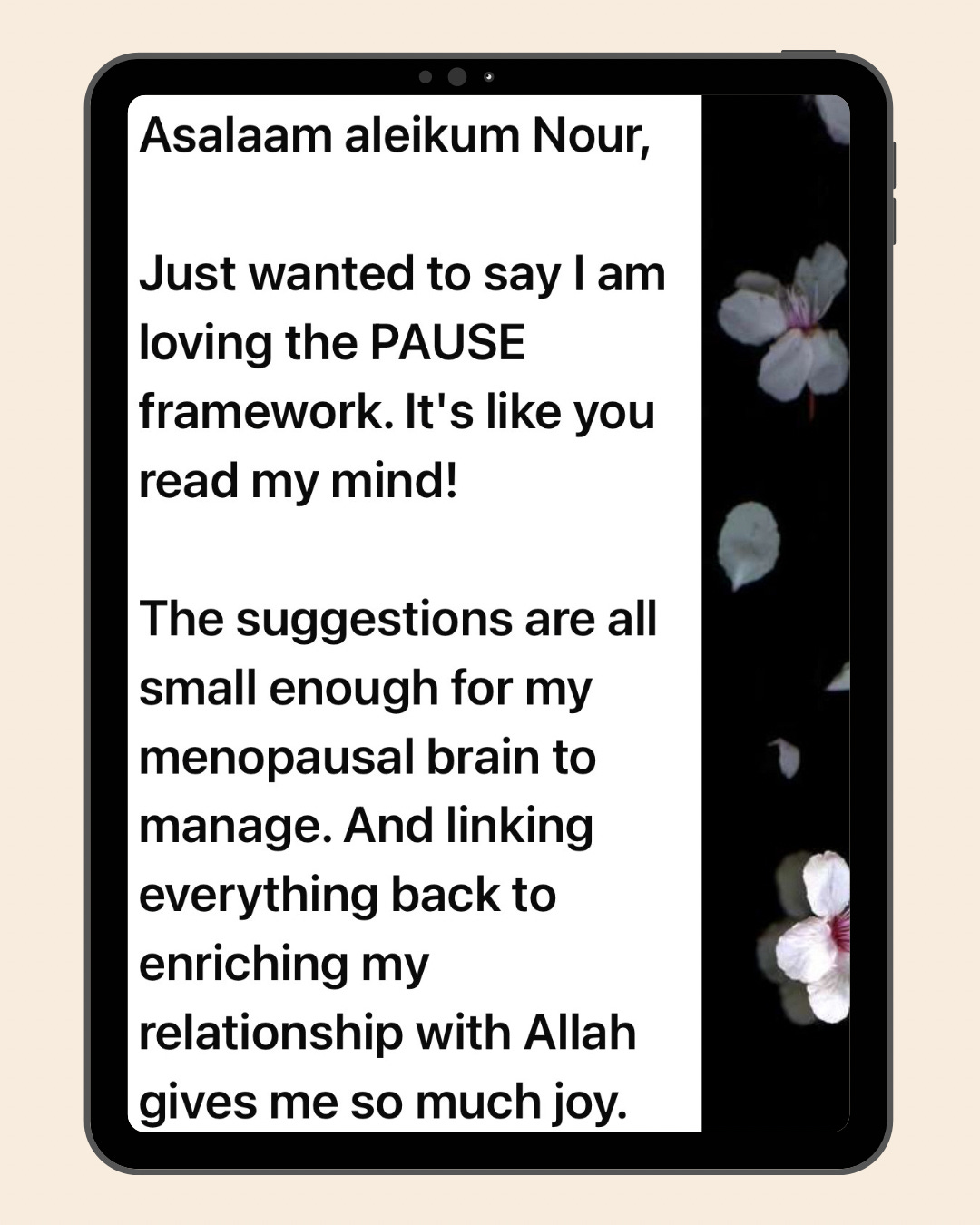﷽

Prefer to listen? You can play the audio version above.
Before you begin, take a moment to set your intention:
Ya Allah, let this reading anchor me more deeply in Your remembrance, Ameen.
Now, breathe. Bismillah
Where We’ve Been
We are now beginning the first week of the Anchor stage in the PAUSE framework, having successfully completed the Purify phase. In the Purify stage, we focused on clearing out the clutter—whether physical, digital, mental, or spiritual—that blocks our connection with Allah and our deeper selves. This foundational work is essential for creating the space needed to build meaningful, lasting routines. If you haven’t had a chance to explore the earlier articles on Purify, I warmly invite you to revisit them and reflect on how this cleansing process has prepared you to move forward with intention and strength.
A Quick Check-In from Week 5
Last week, I asked you to reflect on your intentions. What came up for you?
Was there something you realized you’ve been doing for reasons other than Allah? Did that recognition feel heavy… or freeing?
If you’re reading this and thinking, I saw so much I need to work on, but I don’t know where to start, take heart. You’re not alone. That’s exactly where Mayya found herself this week.

Mayya’s Moment of Realization
It was after Fajr. The sky outside was a soft grey, the kind of light that makes everything seem quieter.
Mayya’s toddler had curled back to sleep. The teens’ bedroom doors were still shut. The hum of the fridge was the only sound.
She sat at the dining table, journal open, pen poised. A cup of chai cooled beside her, its steam curling like a whispered invitation to linger.
She hadn’t planned to write. But the stillness pressed on her, urging her to listen,not to the outside world, but to that inner voice she’d been ignoring.
Last week’s reflection on intentions had left her unsettled.
Not in a way that felt wrong… but in a way that felt like a door had been cracked open to a room she hadn’t entered in years.
She realized — painfully, tenderly — that she could list the needs of everyone in her life with startling clarity.
Mayya began to write a list in her journal, it hurt but also gave relief.
toddler’s bedtime routine.
teens’ exams and emotional storms.
husband’s quiet wish for more time together.
clients’ goals and struggles.
parents’ unspoken expectations.
Staring at the list Mayya felt the pressure of obligation, and the pain of feeling like a failure. In that list where was she? What about her own desires? They were… foggy. Faded. Almost unrecognizable.
It wasn’t that she had sacrificed them out of bitterness — no, she had given her desires up for love, for duty, for what she believed was service to Allah.
But somewhere in that service, she had misplaced herself.
The pen in her hand felt heavier than it should. She took a slow sip of chai, then wrote one question at the top of the page:
“What would my ideal day look like?”
The question sat there, almost defiant.
Her first instinct was to answer it “responsibly”, and to paint a day that looked almost like the one she lived now. But something inside her whispered, “not this time.”
So she wrote without filtering.
She saw herself waking to the sound of the adhan, not the alarm. She felt the coolness of wudu water on her face, the stillness of unrushed Fajr. She heard the slow, melodic recitation of Qur’an — not squeezed in between tasks, but savored.
She imagined coaching fewer clients, but diving deeper with them, unhurried and present.
She saw her laughter mingling with her children’s, not over the noise of reminders and schedules, but in moments that felt wide and free.
Evenings were golden: walking hand in hand with her husband, watching the sun dip behind the horizon, the sky whispering of maghrib.
When she read it back, her eyes prickled with tears.
It was beautiful.
It was far.
And yet… she did not scold herself. holding close the Prophet’s ﷺ way of having compassion toward those who were trying but not there yet — his ﷺ way of encouraging without crushing, guiding without shaming.
She closed her journal, not with the frustration of someone who had failed, but with the quiet certainty of someone who had just found her compass.
This is where many of us live — not in rebellion against our own needs, but in forgetfulness of them.
And sometimes, this forgetfulness is dressed up as piety: “I’m serving others for the sake of Allah.”
But our beloved Prophet ﷺ said:
“Indeed, your own self has a right over you…”
(Sahih al-Bukhari)
Anchoring doesn’t just mean building habits. It means remembering that you are a soul entrusted to you by Allah. Caring for that trust is not selfish — it is obedience.

The Path Forward
Positive psychology teaches us that instead of focusing on everything at once, lasting change comes from identifying vital behaviors — the few key actions that make the biggest difference.
A vital behavior is a small, repeatable action that leads to big results over time. Mayya started praying just two extra minutes every day because she remembered the Prophet ﷺ said, “The most beloved deeds to Allah are those done consistently, even if they are small.” Soon, she felt her heart grow steadier and more connected.
For Mayya, that meant spotting the gaps between her ideal day and her real one, then choosing one small, high-impact habit to anchor first.
She chose to protect her Fajr mornings from her phone. No checking WhatsApp, no diving into emails, no scrolling Instagram “just for a minute.”
It was a small anchor. But it was enough to start changing the tide.
Your Turn to Reflect
Let’s bring this to you.
If you could live your ideal day—feeling connected to Allah, present with your loved ones, and fulfilled in your work—what would it look like? Don’t filter or overthink it. Just write it down.
Your Turn — This Week’s Anchor Practice
Write Your Ideal Day: Find a quiet space: Begin with “Bismillah” and write out your ideal day from Fajr to night. Be honest.
Identify the Gaps: Compare your vision with your current life. Where is the biggest gap?
Name the Vital Behaviors: Choose one daily action that would close that gap most effectively.
Anchor It: Commit to doing that action every day this week, for Allah’s sake.
Reflect at Night or the following morning: Ask yourself: Did this action bring me closer to the day I envisioned — and closer to Allah?
Hit reply or comment and share with me: What’s the one habit you’re anchoring this week?
I’d love to hear your reflections and support you on this journey.
Remember, the Prophet ﷺ said, “The most beloved deeds to Allah are those done consistently, even if they are small.” So take your time, be gentle with yourself, and celebrate every step forward.
And if you want more inspiration, keep an eye out for the relaunch of From Nour with Love—a monthly podcast designed to help you stay steady and inspired, insha’Allah! Thank you for those who voted to bring back the podcast. It was a unanimous vote. I appreciate you my friend.
May Allah bless your efforts and fill your days with peace and purpose. Ameen.
A Note from This Community
Last week, I received this reflection from a reader:
Thank you for your feedback and keep it coming it brings me joy!
May Allah anchor you in His remembrance, steady your steps in good, and fill your days with light and meaning Ameen.
Much love,
Nour Cauveren




